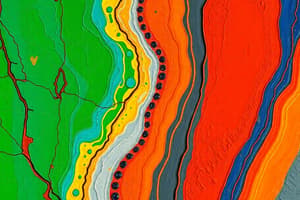Podcast
Questions and Answers
What is the primary source of heat driving endogenous processes within the Earth?
What is the primary source of heat driving endogenous processes within the Earth?
- Thermal energy of the mantle (correct)
- Tidal forces
- Geothermal energy
- Solar radiation
At what temperature range does magma typically form?
At what temperature range does magma typically form?
- 1500-2000°C
- 800-1200°C (correct)
- 200-400°C
- 400-800°C
Which process involves the escape of magma through openings in the Earth's surface?
Which process involves the escape of magma through openings in the Earth's surface?
- Volcanism (correct)
- Metamorphism
- Erosion
- Sedimentation
In which type of metamorphism does mineral change occur over a large area due to heat and pressure?
In which type of metamorphism does mineral change occur over a large area due to heat and pressure?
What is magma called once it reaches the Earth's surface?
What is magma called once it reaches the Earth's surface?
Study Notes
Endogenous Processes
- Occur within Earth's interior, driven by thermal energy from the mantle.
- Responsible for natural phenomena like earthquakes, continental development, mountain formation, and volcanic activity.
- Earth's internal heat originates from early formation physical processes and radioactive decay.
Earth's Internal Temperature
- Crust base temperature approximately 1000°C.
- Mantle base temperature around 3500°C.
- Core temperature exceeds 6000°C.
Magmatism
- Magma is the molten material that forms igneous rocks and is generated from rock heating (800-1200°C).
- Heated by convection flow, magma is constantly in motion within the mantle.
Volcanism (Plutonism)
- Occurs after magma formation, as it seeks escape through volcanic openings or ground fissures.
- When magma reaches Earth's surface, it is referred to as lava.
Metamorphism
- Involves altering the composition and structure of rocks due to heat and pressure.
- Chemical elements and geological properties of rocks can change significantly.
Types of Metamorphism
- Contact Metamorphism: Occurs when rock minerals and texture are altered primarily by heat.
- Regional Metamorphism: Encompasses large-scale changes in rocks due to widespread heat and pressure.
Studying That Suits You
Use AI to generate personalized quizzes and flashcards to suit your learning preferences.
Description
Explore the fascinating world of endogenous processes occurring within the Earth. This quiz covers topics such as earthquakes, volcanic activities, and the internal heat generated by the mantle. Test your knowledge on the thermal energy that shapes our planet's geological features.




